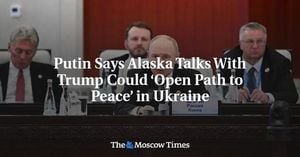On the morning of August 27, 2025, the Annunciation Catholic parish in Minneapolis—usually a place of quiet reflection and childhood innocence—was shattered by gunfire during a welcome-back Mass for schoolchildren. In those chaotic minutes, two young lives were lost, 21 others were left injured, and a community was thrust into a storm of grief and reckoning that has since rippled far beyond the church’s stained glass windows.
For the Maldonado family, who live just blocks from Annunciation Catholic School, the nightmare was personal and immediate. Carla and Pedro Maldonado raced to the church after hearing news of the shooting, desperate to find their children, Pilar, 7, and Pablo, 11. "Probably the worst 20 minutes in my life," Pedro Maldonado told NBC News. "The desperation only a parent can experience in these cases, terrible. And at the same time, trying to help the other kids that are desperate."
Pilar, just a first-grader, survived by hiding under a pew, whispering a prayer: "I was saying, ‘It’s too early for me to die. I’m just 7 years old. I’m just a kid. I need more life, and God, please protect me,’" she recalled. Pablo, her older brother, later attended Mass with his father, struggling with the trauma but finding a measure of comfort in the familiar rituals of faith. "Even though I’m a little traumatized by going to church, it’s just good to be, like, praying about it ... be with God," Pablo said. He admitted he doesn’t like to talk about what happened, but being around friends has helped him cope. "I really hope it’s gonna go easier, like, every day," he added.
Their mother, Carla, is a trauma therapist. She’s been taking life one hour at a time, focusing on her children’s basic needs and their emotional recovery. She believes the best healing comes from togetherness. "When we see them get together and we overhear some of their conversations, it’s like, yeah, this is who you need. These are the only people that are going to know what you went through on a level that nobody else will ever know," she observed. For the Maldonados and so many others, the path to healing is uncertain and will take time. "As a parent, this is something that I wish nobody ever, ever goes through this, because it’s a feeling that nobody can imagine," Pedro Maldonado said. "Especially when you’re in a church, and the ones inside the church are kids praying for a better world."
Among the injured was 10-year-old Weston, who was sitting in a pew next to the stained glass windows when the gunfire erupted. At first, he thought he’d only gotten gunpowder on his neck. It was only later, according to a GoFundMe page set up by his family, that doctors discovered a bullet fragment lodged dangerously close to his carotid artery. Now, Weston faces surgery to remove the fragment. The fundraiser described him as a boy whose "love of basketball, being with friends, and enjoying a candy or two" is matched only by his "quick wit, persistence, and earnestness." Despite the trauma, Weston expressed gratitude for his friends and prayed for their recovery, showing a resilience that’s both heartbreaking and inspiring.
Weston’s friend, who was sitting beside him, wasn’t as lucky—he was shot in the back. As of September 1, Hennepin Healthcare was still caring for four patients from the shooting, including three children (two in satisfactory condition, one in critical), and an adult who remained under care. The last patient at North Memorial hospital had been released, a small mercy amid the larger tragedy.
The shockwaves from the shooting have reverberated far beyond Minneapolis. Catholics around the world, according to NPR and Religion News Service, were shaken by the violence. Church leaders and educators have responded with both prayer and practical action. Catholic educators quickly met to pray in their communities and reached out to law enforcement to review safety plans. Karen Rebhan-Csuk, an education official in the Archdiocese of Chicago, noted a sobering shift in school safety practices: "You don’t think you need to practice that in the church, right? But now will our schools be doing that? Absolutely, they will be doing that—if they haven’t already." Schools in the Archdiocese of Chicago are now practicing safety drills within their sanctuaries, a sign of changing times.
In Los Angeles, Superintendent Paul Escala acknowledged that spaces once considered safe—like churches and schools—must now be seen as potentially at risk. "We’ve been very explicit with our schools and our churches that they need to now consider, if they hadn’t before, the sanctuary as an area that could also be at risk," Escala said. But he cautioned against succumbing to fear. "If we have one another and if we look out for one another—we truly have that neighborly approach to living in society—we can do a better job of protecting each other from this kind of violence." The Archdiocese of Los Angeles is reviewing safety plans for both schools and churches, emphasizing vigilance and community support.
For some Catholic leaders, the tragedy at Annunciation Church is yet another chapter in a grim national story. San Antonio Archbishop Gustavo Garcia-Siller, who was in Uvalde after the 2022 Robb Elementary School shooting, has grown frustrated with the lack of progress. "We cannot just let these stories to continue piling up. And people are being killed, all ages and all over," he told NPR. Despite memorials and prayers for Uvalde, "the changes have not happened in any way—not even in small ways." After hearing of the Minnesota shooting, Garcia-Siller renewed his call for tighter gun safety laws: "Alas, we heard about this last one. Again, all these arms in the hands of people that they should not have them, but that we as a society make those arms available."
The debate over gun safety, of course, is a contentious one in the United States. Some argue that additional regulations are necessary to prevent firearms from falling into the wrong hands, especially in places where children gather. Others contend that such measures would infringe on constitutional rights and might not address the root causes of violence. Within the Catholic community itself, there’s a spectrum of opinion—ranging from vocal advocacy for reform to a focus on prayer and community resilience.
Back at Annunciation Church, Rev. Dennis Zehren sought to guide his flock through the darkness. During a recent Mass, he told parishioners, "We welcome the dawn of a new day here in Annunciation. We welcome the light of a new day, and it’s a light that will scatter every darkness. It’s a light that will never fade." Zehren reflected on the "kind of funny mystery" that light shines brightest when darkness is most intense. "I have never seen such an outpouring of love," he said. "I have never been so proud of the faithful followers of Jesus, never been so grateful for our church, never been so filled with love that just comes from above and beyond."
For the families, the teachers, and the faithful of Annunciation, the journey forward is fraught with pain but also illuminated by moments of hope and community. As the church and its school adapt to new realities, the memory of August 27 will remain—a stark reminder of vulnerability, but also of the strength that can emerge when tragedy strikes close to home.







